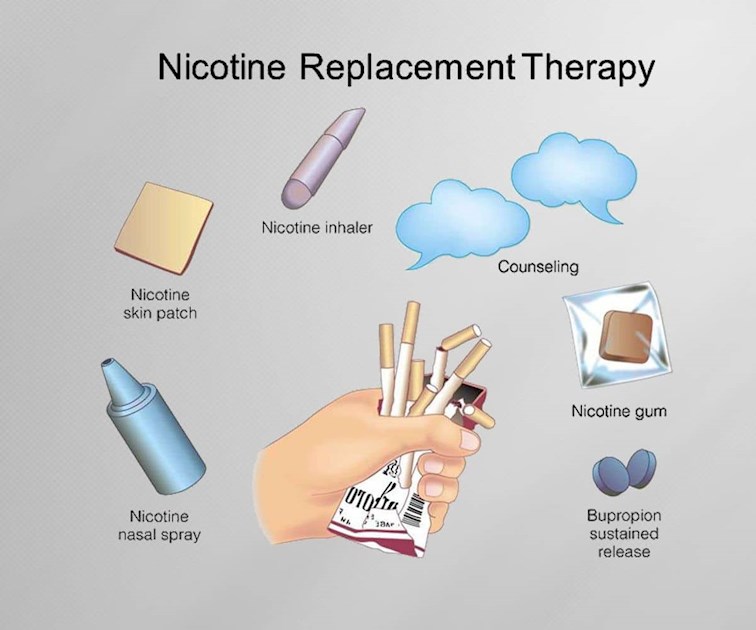(courtesy of the N.h.s.)
What are Some Common Facts About Nicotine Replacement Therapy?
•A number of cigarettes you used to smoke will determine the dose you will first need.
•Entering a counselling program can be of great help.
•You are highly advised against smoking cigarettes while you are going through the nicotine replacement therapy because nicotine can build up to toxic levels.
•When on nicotine replacement, your urge to munch on food will decrease, which in turn will prevent weight gain.
•Try to reduce your daily nicotine dose slowly .
Remember we are not all the same , and each smokers quit will vary on different
facts. i.e. age, gender, enviroment, and general physical and mental health.
What are stop smoking medicines?
Cigarettes contain nicotine. By smoking regularly and over a long period of time, your body becomes dependent on it. Giving up smoking can cause nicotine withdrawal symptoms, which include cravings, headaches, feeling irritable and not being able to sleep. Stop smoking medicines can help you manage these withdrawal symptoms.
There are three types of stop smoking medicines:
•Champix tablets (varenicline)
•Zyban tablets (bupropion)
•Nicotine replacement therapies (NRT), including patches, gum, lozenges, microtabs, inhalators, e.cigs, and nasal sprays
All are available from the NHS with a prescription, and NRT can also be bought from pharmacies and other shops (such as supermarkets) without a prescription.
How does NRT work?
All licensed nicotine-containing products are effective treatments to help you stop smoking, but you may wish to seek advice from your pharmacy team, doctor or local NHS Stop Smoking Service to help you decide which is right for you. No single NRT product is better than any other and there are a number of options. Discuss the most appropriate product for you with your healthcare professional. Because NRT gives you a lower dose of nicotine than you get from cigarettes, many people use the patch to give a background dose of nicotine and one of the other products to top this up.
Also remember that a full course of NRT can last for approximately 8-12 weeks (depending on the type you are using) so it is important you stick with it! However, if one type of NRT doesn't work for you, or if you experience any problems or have any questions, talk to your healthcare professional for advice. For all these products, please read the leaflet which will advise you on how to use the medicine and the maximum amount you can take every day.
Is NRT safe? Am I just replacing one addiction with another?
Some people think that using NRT is just swapping one addiction for another. But this isn't true.
Smoking is highly addictive, largely because it delivers nicotine very quickly to the brain and this makes stopping smoking difficult. The nicotine levels in licensed nicotine-containing products are much lower than in tobacco, and the way they deliver nicotine makes them less addictive than smoking.
Most health problems are caused by other components in tobacco smoke, not by the nicotine. It is safer to use licensed nicotine-containing products than to smoke. There is reason to believe that lifetime use of licensed nicotine-containing products will be considerably less harmful than smoking.
Are there any health implications?
It is safer to use licensed nicotine-containing products than to smoke. NRT products have been demonstrated in trials to be safe to use for at least five years.
NRT is suitable for most adults, but if you have a heart or circulatory condition, or are on regular medication, you should check with your doctor. Similarly, if you are pregnant you should ask your doctor or midwife before using NRT.
When should I stop using NRT?
Most courses of NRT recommend use for about 12 weeks. This is because it takes about that long for the receptors in the brain to adjust to working without the high doses of nicotine that cigarettes supply. However, there is no hard and fast rule that suits everyone. A common mistake people can make is to stop using their product too soon. Because NRT can work so well at reducing nicotine withdrawal, it is easy to mistake a lack of discomfort for a belief that the addiction is over. By stopping use of NRT, the cravings can return and the desire to smoke can return. The best option is to speak to your healthcare professional when you start using the product and keep them updated as you progress.
